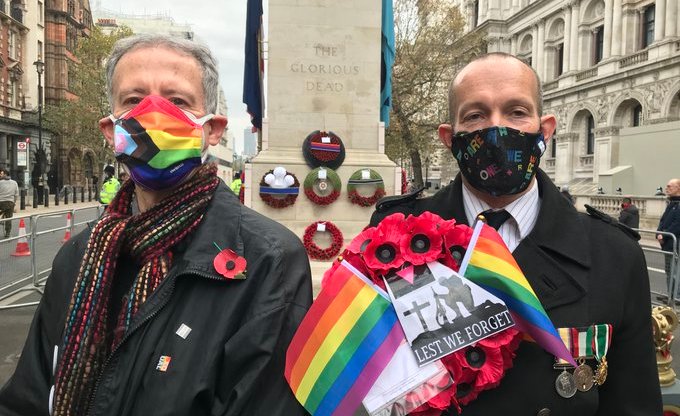Rainbow poppy wreath laid at the Cenotaph in remembrance of the LGBT+ heroes who gave their lives for freedom

Peter Tatchell and David Bonney laid a rainbow poppy wreath at the Cenotaph. (Peter Tatchell/Twitter)
A rainbow poppy wreath was laid at the Cenotaph on Remembrance Sunday (November 8) by campaigner Peter Tatchell and RAF veteran David Bonney.
Bonney was the last UK serviceman to be imprisoned for his sexuality before the UK ban on LGBT+ military personnel was overturned. He was sentenced to six months in prison after being court-martialled in 1993, his dishonourable discharge only annulled after a later appeal.
Bonney joined Tatchell to lay a wreath of red poppies, LGBT+ Pride flags and the pink triangle to honour the LGBT+ troops who sacrificed their lives fighting for freedom.
Tatchell and Bonney visited the Cenotaph at 1pm, shortly after the official Remembrance Sunday ceremony. Plans for a larger memorial had been afoot, but were cancelled in line with lockdown regulations.
“It is important to keep laying rainbow wreaths, otherwise the sacrifices of LGBT+ service people in the Second World War and other conflicts will be forgotten,” said Bonney, who was a senior aircraftman, in a statement through the Peter Tatchell Foundation.
Tatchell added: “It is right that we honour all those who fought for freedom, including women, Black and LGBT+ military personnel.”
At #RemembranceSunday: Lest We Forget military & civilian victims of Nazism & other tyrannies, persecuted conscientious objectors, LGBTs murdered by the Nazis & LGBTs dismissed by military after risking their lives to defend freedom. UK govt should compensate them @PrideInLondon pic.twitter.com/Af5VTwzDd0
— Peter Tatchell (@PeterTatchell) November 8, 2020
The human rights activist noted that as many as 500,000 LGBT+ personnel are thought to have served on Allied forces, many of whom were “witch-hunted” and robbed of their livelihoods, with their lived experiences routinely erased.
“For decades, the Royal British Legion refused to acknowledge that any LGBT+ people gave their lives to defend democracy,” he continued.
“Wreaths in their memory were removed from the Cenotaph and often vandalised. LGBT+ veterans were refused permission to march as a contingent in the Remembrance Day parade.
“In November 1971, gay people were arrested when they laid pink triangle crosses in the Field of Remembrance outside Westminster Abbey. Until 1985, LGBT+ wreaths were banned at the Cenotaph. We had to fight the Royal British Legion and Ministry of Defence to get that ban overturned.”
David Bonney spent time in solitary confinement after admitting he was gay.
Bonney spoke of his own experiences: how he was subjected to a two-year investigation after a search of his room turned up a copy of Gay Times.
He said investigators subsequently bugged his communications, had him tailed and placed officers outside local gay bars to spy on him. Local police were also used to “interrogate [his] friends”, he continued.
“The RAF investigators created an atmosphere of intimidation and fear,” Bonney added.
“When I did not crack and confess, the RAF resorted to dirty tricks. They gave me short term postings to far flung parts of the UK without giving me a means to get there, so if I failed to turn up I would be registered as ‘absent without leave,’ a disciplinary offence.
“I endured threats of violence from my fellow servicemen. After almost two years, the abuse got to me and I finally admitted to being gay.”
Bonney was court-martialled in October 1993, dishonourably discharged and sentenced to six months in prison. He served one month in solitary confinement.
To this day, I am still being punished.
It was only after lobbying, he said, and an appeal that he was given a belated honourable discharge.
“When I later worked as a nurse, I had to disclose my criminal record and this cast a shadow over my employment opportunities,” he added.
“To this day, I am still being punished: the Ministry of Defence refuses to pay my full pension.”
Until 2000, when the courts overturned a ban on queer troops, military personnel discovered to be LGBT+ were dishonourably discharged and lost their pension rights.
In 2019 it was reported that just over 150 people had sought compensation from the Ministry of Defence.
An internal report seen by the Independent said that about £4 million had been paid in compensation, with the MoD admitting its former policy was “wrong, discriminatory and unjust to the individuals involved”.
Tatchell and the campaign group Liberty have called on the government to proactively contact those whose lives and livelihoods were impacted by the homophobic policy, with Tatchell estimating the number of people discharged for being LGBT+ was “likely to run into thousands”.
PinkNews contacted the Ministry of Defence for comment.

